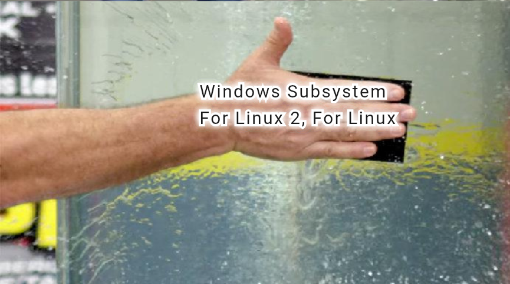I still will never understand why it's not called Linux Subsystem for Windows.
Technology
This is a most excellent place for technology news and articles.
Our Rules
- Follow the lemmy.world rules.
- Only tech related news or articles.
- Be excellent to each other!
- Mod approved content bots can post up to 10 articles per day.
- Threads asking for personal tech support may be deleted.
- Politics threads may be removed.
- No memes allowed as posts, OK to post as comments.
- Only approved bots from the list below, this includes using AI responses and summaries. To ask if your bot can be added please contact a mod.
- Check for duplicates before posting, duplicates may be removed
- Accounts 7 days and younger will have their posts automatically removed.
Approved Bots
There's a trademark for Linux so Microsoft can't name a product starting with Linux.
So they can use Linux in the name, just not at the beginning? We're so stupid. Can they do Windows Subsystem for Coke? Or Windows Subsystem for McDonald's? Or Windows Subsystem for MacOs?
Good gravy.
I think trademark law has a strange history in the US
I'm sure it does, I was just being facetious.
Sorry, "gravy" is a registered trademark of Gravy, Inc.: https://trademarks.justia.com/854/89/gravy-85489026.html
I think this only applies to using the word “gravy” for payment services or a website referring to such a payment service. There was a prior trademark on the word for use with plush toy products.
Still doesnt explain why it wasn't called Windows Linux Subsystem (WLS)
I got hung up on this before too but it's apparently "Windows Subsystem for (using) Linux"
I think it is because Windows has many subsystems, it's just that you don't hear about most of them aside from WSL.
So it is referring to the particular Windows Subsystem (of which there are many) that can run or emulate Linux.
Maybe they just named it like the previous attempt: https://en.wikipedia.org/wiki/Windows_Services_for_UNIX
Don't you think this is another Embrace, Extend, and Extinguish strategy from Microsoft?
That's exactly what it is. Any time now you'll see "the best way to run Linux: on windows" or similar.
Does Lemmy even know what EEE means anymore or are we regurgitating words we heard from some article now?
What's it going to embrace and extend? WSL has existed for ages and is just a way to run Linux in a convenient container on top of Windows. That's it. It's not an attempt to "extenguish" Linux, literally just make the development experience on Windows less painful so people don't switch to another OS. This has nothing to do with EEE.
Open sourcing it with a permissive license can only be a good thing, and again they're doing it to be more appealing to devs and maybe get free bug fixes from the open source community. It isn't some grand conspiracy. But of course this community will react to news of "proprietary blob is now open source" with pessimism.
literally just make the development experience on Windows less painful so people don't switch to another OS.
You said it right there yourself and don't seem to realize it.
Why have a laptop or a dual boot with Linux when you can now more easily stay on the proprietary OS ?
This is called market retention.
Preventing migration to another OS, another software ecosystem.
The 'Embrace' and 'Extend' parts of EEE.
And if it works, then in a few years, MSFT will figure out how to further monetize some other part of its software ecosystem that is either reliant on, or much much easier for an average user of WSL to use than switching their whole setup or stack all the way over to Linux.
Call that EEM for 'monetization' if you want, or 'enshittify' for another E...
...the commonly used term to describe software or services or platforms that suddenly jump over to making previously free stuff cost money, put ads everywhere, break the previously free features and put the 'new' working versions behind some kind of paywall...
... All after you've captured your market and dominated as many competitors as possible.
Standard monopolist strategy throughout the entite history of capitalism, same general concept goes back even further.
Why have a laptop or a dual boot with Linux when you can now more easily stay on the proprietary OS ?
This is called market retention.
Preventing migration to another OS, another software ecosystem.
The ‘Embrace’ and ‘Extend’ parts of EEE.
That's stretching the definition to the point it's nearly unrecognisable.
What the term meant was for things like Internet Explorer, where MS adopted an existing standard (Embrace), started changing it in incompatible ways (Extend), while using their market power to lock out competitors (Extinguish)
e.g. IE used an incompatible method for sizing and laying out elements than any other browser, so a site that laid out properly in NN4 looked broken in IE6, and vise versa. So most devs targeted IE6 as it was more popular, and NN4 users got more and more broken sites.
ACPI was similar, Windows had an extremely lax implementation of it, so motherboards often shipped with bugs that Windows would ignore but would stop anything else from booting. Intentional? Doesn't really matter, since it sure was helpful in slowing the adoption of things like Linux, that had to come up with workarounds for all the broken hardware.
Linux is a standard they have Embraced.
As a for-profit tech monopolist, they will, very predictably, Extinguish the ability of people who use WSL instead of just actually Linux... to be easily able to... fully transition to a competitor (Linux).
The Extend part just looks different, because the scope of software competition offered by Linux is much more vast than just a particular standard for a particular kind of software.
... Potato, potato.
I used to work for Microsoft.
The ethos is absolutely still there: Create vendor lock in, create ecosystem dependence in every way possible, as well as in ways that 99% of people would not even think are possible.
EEE is just the term they came up with to describe their own, overarching, monopolist general strategy, and if you wanna quibble over the precise technicalities of an internal corporate slogan, well then you'd be the kind of person MSFT is filled with that made me no longer want to work for them.
I think it's an attempt to keep people on their platform who need easy access to a unix-like shell. Linux has it and so does mac os. Windows didn't until they introduced wsl.
I think it’s more embrace. They have to compete against so many more entities now.
This is my thought, they've all but lost the battle for cloud servers and they'd rather the developers computers were Windows. WSL allows that.
Normally I would say yes, but WSL is so incredibly necessary for a developer that it might be legit.
I don't think that, as Microsoft hasn't done a lot (any?) of that stuff in recent years. It's good to be cautious but really what is the problem with opening the source for something that already existed for a while and is embraced by many?
I know there's a lot of hate for Microsoft on Lemmy, but WSL is one of the best parts of Windows. It's really powerful and well integrated to Windows. Since I still can't leave for pure Linux install, I'm glad for WSL.
Funny that the Linux is best part of Windows lmao
Microsoft hate is justified.
WSL made windows tolerable in the time I had to use a windows machine for work.
macOS is still the better choice for corp approved work, integrates decently with IT systems and is a “real” unix system underneath.
Linux on a corporate desktop is mostly about how well you know the IT guys and do they trust you. And of course the software stack.
Fair play to Microsoft here. Hopefully we see some pull requests from non-ms employees and a better wsl experience for us all
Great! With this source code out, I can finally complete the port to Linux. I call it WSL24L, aka "Windows Subsystem For Linux 2, For Linux"
Do you name every FOSS project? This is uncannily close to what an actual open source project would be called, including the logic behind it.
This is for WSL2, not for WSL1. WSL2 is just a VM, not a big deal it it's open-sourced. WSL1 is superior to WSL2 in every way. BTW, WSL2 is not a continuation of WSL1, they are being developed in parallel. I still try to use WSL1 whenever possible. For Linux specific features, like systemd dependancy and mounting file systems, I'd use full-featured VM instead of WSL2.
So besides the brownie points, im curious what having it open sourced will benefit. Not like you can fork it to run on a different OS. You can make some extensions but to do what? You can’t really tie it further in to the host OS unless you know of some undocumented Win32 APIs.
Maybe im just not thinking creatively enough.
They released their code as MIT which is far more permissive than I was expecting. I was expecting some sort of proprietary license.
But they need to keep doing stuff like this. Devcontainers for VS Code is still proprietary and keeps me from running codium.
I am legit excited to install WINE Subsystem for Linux
Or how about KDE on ReactOS on WSL?
The possibilities are endless
Making WSL open source could actually lead to some useful contributions and better transparency overall ; and good for Linux tools?
fuck microsoft and windows so hard. had to reinstall that shitshow on my mothers computer because a driver update fucked the whole networkstack... they throw error codes and what not but give no help whatsoever. the conclusion of everyone for every problem is to reinstall windows.... shitshow of an os, keep your dirty hands of linux!! can't wait to nuke it and install linux there and have no windows machine left


